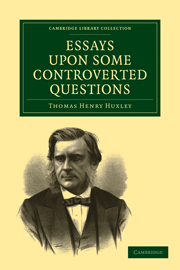Book contents
- Frontmatter
- Contents
- Dedication
- PROLOGUE
- I THE RISE AND PROGRESS OF PALÆONTOLOGY
- II THE INTERPRETERS OF GENESIS AND THE INTERPRETERS OF NATURE
- III MR GLADSTONE AND GENESIS
- IV THE EVOLUTION OF THEOLOGY: AN ANTHROPOLOGICAL STUDY
- V SCIENCE AND MORALS
- VI SCIENTIFIC AND PSEUDO-SCIENTIFIC REALISM
- VII SCIENCE AND PSEUDO-SCIENCE
- VIII AN EPISCOPAL TRILOGY
- IX AGNOSTICISM
- X THE VALUE OF WITNESS TO THE MIRACULOUS
- XI AGNOSTICISM: A REJOINDER
- XII AGNOSTICISM AND CHRISTIANITY
- XIII THE LIGHTS OF THE CHURCH AND THE LIGHT OF SCIENCE
- XIV THE KEEPERS OF THE HERD OF SWINE
- XV ILLUSTRATIONS OF MR. GLADSTONE'S CONTROVERSIAL METHODS
- XVI HASISADRA'S ADVENTURE
- Frontmatter
- Contents
- Dedication
- PROLOGUE
- I THE RISE AND PROGRESS OF PALÆONTOLOGY
- II THE INTERPRETERS OF GENESIS AND THE INTERPRETERS OF NATURE
- III MR GLADSTONE AND GENESIS
- IV THE EVOLUTION OF THEOLOGY: AN ANTHROPOLOGICAL STUDY
- V SCIENCE AND MORALS
- VI SCIENTIFIC AND PSEUDO-SCIENTIFIC REALISM
- VII SCIENCE AND PSEUDO-SCIENCE
- VIII AN EPISCOPAL TRILOGY
- IX AGNOSTICISM
- X THE VALUE OF WITNESS TO THE MIRACULOUS
- XI AGNOSTICISM: A REJOINDER
- XII AGNOSTICISM AND CHRISTIANITY
- XIII THE LIGHTS OF THE CHURCH AND THE LIGHT OF SCIENCE
- XIV THE KEEPERS OF THE HERD OF SWINE
- XV ILLUSTRATIONS OF MR. GLADSTONE'S CONTROVERSIAL METHODS
- XVI HASISADRA'S ADVENTURE
Summary
Within the last few months the public has received much and varied information on the subject of agnostics, their tenets, and even their future. Agnosticism exercised the orators of the Church Congress at Manchester. It has been furnished with a set of “articles” fewer, but not less rigid, and certainly not less consistent than the thirty-nine; its nature has been analysed, and its future severely predicted by the most eloquent of that prophetical school whose Samuel is Auguste Comte. It may still be a question, however, whether the public is as much the wiser as might be expected, considering all the trouble that has been taken to enlighten it. Not only are the three accounts of the agnostic position sadly out of harmony with one another, but I propose to show cause for my belief that all three must be seriously questioned by any one who employs the term “agnostic” in the sense in which it was originally used. The learned Principal of King's College, who brought the topic of Agnosticism before the Church Congress, took a short and easy way of settling the business :—
But if this be so, for a man to urge, as an escape from this article of belief, that he has no means of a scientific knowledge of the unseen world, or of the future, is irrelevant. His difference from Christians lies not in the fact that he has no knowledge of these things, but that he does not believe the authority on which they are stated. […]
- Type
- Chapter
- Information
- Essays upon some Controverted Questions , pp. 329 - 377Publisher: Cambridge University PressPrint publication year: 2009First published in: 1892
- 1
- Cited by



